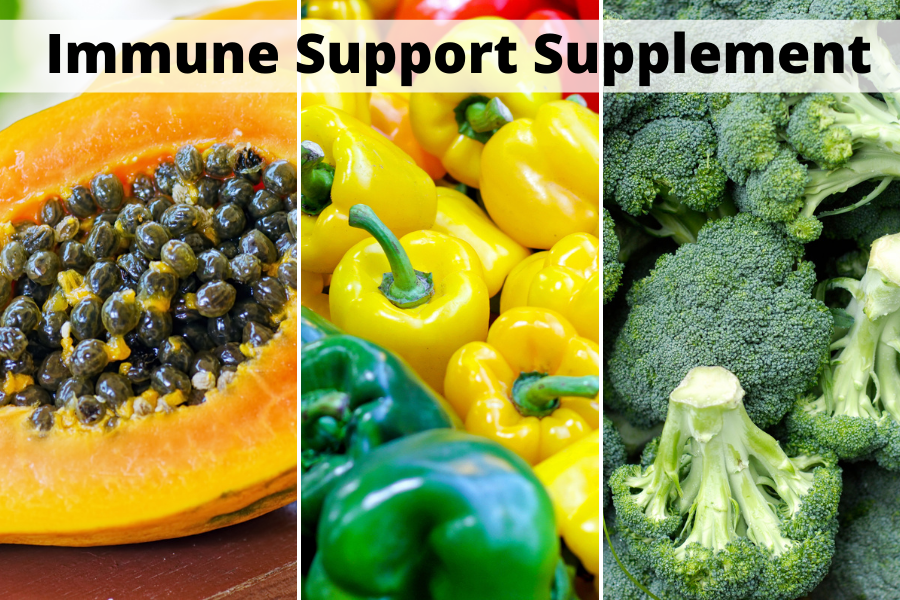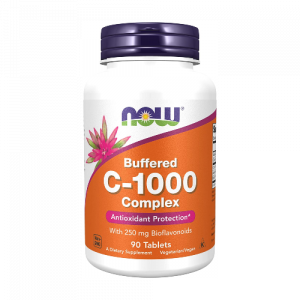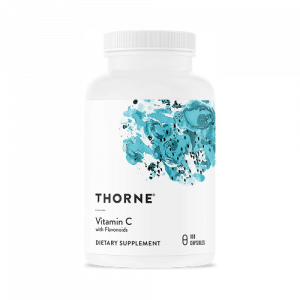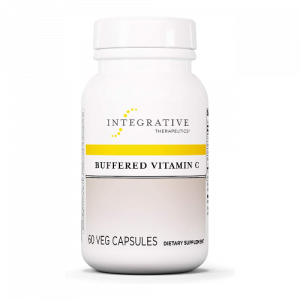Want to know the key benefits of the immune support supplement vitamin C? These are the top immune-boosting benefits of vitamin C you need to know about.
Vitamin C could easily win the #1 spot for the best immune support supplement. We are often told to get more vitamin C when we get cold or flu symptoms. We all hear about how important vitamin C is for our immunity, but what exactly does vitamin C do for our immune system? In this post, we are giving you the 5 key benefits of the immune support supplement vitamin C
In addition to covering the top 5 immune-boosting benefits of vitamin C, we will cover the top food sources of vitamin C. Certain immune boosting vitamins and minerals your body needs must be obtained from outside sources. The human body cannot produce certain vitamins and minerals. Vitamin C is one of those. We believe the best place to get your vitamin C (and any other vitamins and minerals) is from food and not pills.
Why is it best to get vitamin C from food rather than pills? Pills often have added fillers, chemicals, and can cause stomach upset. Also, vitamin C obtained from food gives you additional beneficial nutrients. Also, vitamins and minerals are easier to digest and absorb when they come from food rather than pills.
However, if you still really want some recommended vitamin C immune support supplements that come in a bottle, we will give you our top 3 picks for those as well. We understand that sometimes you may really need the extra vitamin C minus the extra sugar found in many fruits. You may have diet restrictions or time constraints that make you want to use pills in addition to food for your vitamin C.
After learning about all these immune support benefits and sources of vitamin C, you are going to be more motivated to add vitamin C to your diet and achieve a stronger immune system as a result.
This post is all about the immune support supplement vitamin C.
Best Immune Support Benefits of Vitamin C
1. Vitamin C is an Antioxidant
 One of the main immune support functions of vitamin C is that it is an antioxidant. Antioxidants boost your body’s natural defenses. The antioxidant levels in your body will go up as you eat more vitamin C rich foods. Antioxidants fight free radical molecules in your body that damage cells. Many human diseases such as hardening of the arteries and cancer may occur partly because of the damage these free radicals do to cells. Because vitamin C is an antioxidant, it neutralizes free radicals, supporting the body’s efforts to prevent cell damage.
One of the main immune support functions of vitamin C is that it is an antioxidant. Antioxidants boost your body’s natural defenses. The antioxidant levels in your body will go up as you eat more vitamin C rich foods. Antioxidants fight free radical molecules in your body that damage cells. Many human diseases such as hardening of the arteries and cancer may occur partly because of the damage these free radicals do to cells. Because vitamin C is an antioxidant, it neutralizes free radicals, supporting the body’s efforts to prevent cell damage.
2. Vitamin C has Antiviral Properties
Vitamin C has demonstrated activity agains a number of different viruses. Injections of vitamin C were successfully used in treating viruses such as polio, shingles, herpes simplex and more in the middle of the 20th Century. Several studies have found that vitamin C may activate an immune response against some flu viruses. Specifically, vitamin C up-regulates the activity of natural killer cells and T lymphocytes, which help kill pathogens in the body.
Vitamin C helps the body produce antibodies. Antibodies are proteins that bind to invading pathogens to neutralize them. These antibodies help the body have a memory of the pathogens that invaded it before. Each antibody is shaped to attack a specific type of virus. This memory of the virus means that the antibodies can be produced quicker if the same virus tries to infect you again.
Some medical professionals say that antibodies only last a few months, but this is much better than not having them at all and may cover you for the time you are most likely to be re-infected with the same virus. Vitamin C helps the body’s immunological memory, so it can better fight a virus, or another type of pathogen, the second (or third, fourth, etc.) time around.
Additionally, vitamin C has been found to help shorten the average length of the common cold, which is commonly caused by a virus.
3. Vitamin C is an Anti Inflammatory
Free radical molecules are a big cause of inflammation in people’s bodies. What causes free radical molecules to exist in our bodies? Free radicals come from your body’s normal metabolic functions or they can be increased by exposure to environmental toxins such as radiation, smoke, pollutants, and chemicals. Because vitamin C is an antioxidant, it neutralizes these free radicals and therefore helps reduce inflammation in the body.
Many diseases involve chronic (longterm) inflammation, such as arthritis, COPD, heart disease, cancer, diabetes, and bowel diseases. Vitamin C, working as an antioxidant, can help support the body’s efforts to reduce inflammation caused by these disease processes.
4. Vitamin C is an Antihistamine
Vitamin C acts as a natural antihistamine. Free radicals damage cells and this cell damage plays a part in causing allergies. Your body feels like it’s being attacked when cell damage occurs. Your body responds to this cell damage by producing more histamine. Histamine is a chemical in your body that causes you to have allergy symptoms such as sneezing, watery eyes, runny nose, headache, and itchiness. Vitamin C, working as an antioxidant, helps reduce stress and cell damage in the body. This reduction of stress in the body means that your body may produce less histamine because your body doesn’t feel like it’s being attacked.
Vitamin C also reduces the severity of allergic reactions. Vitamin C slows down the body’s response to allergens by actually decreasing your body’s production of histamine. Histamine is the body’s way of letting you know you are allergic to something and need more immune support and detoxification to strengthen your immunity.
5. Vitamin C is an Antibiotic
Studies indicate that vitamin C has activity against a variety of infections ranging from bacteria, viruses, and protozoa. What specifically does vitamin C do to combat bacteria? Vitamin C has immune system modifying properties that support the body’s fight against bacterial infections. This means vitamin C can be considered a type of antibiotic. Antibiotics fight bacterial infections.
Another clue to vitamin C’s activity against infections is that low levels of vitamin C have been associated with people who develop pneumonia. Pneumonia may be caused by viruses, bacteria, or fungi.
Specifically, some of vitamin C’s immune modifying properties include its ability to help white blood cells function better. Vitamin C also encourages the body to produce more white blood cells as needed to protect the body from infections. There are five major types of white blood cells and they have functions such as breaking down bacteria, killing and digesting bacteria and fungi, and fighting against bacteria, viruses and other pathogens.
If all this wasn’t enough, vitamin C has also been found to help wounds heal faster. Improving our internal and external physical barriers to infection is a great way to help keep bacteria and viruses out of our bodies.
Vitamin C Foods
Here are the top vitamin C foods as detailed by the fantastic website The World’s Healthiest Foods. Remember that steaming vegetables helps preserve more of the vitamin C content rather than boiling. As much a 50% or more of the vitamin C content of foods can disappear by boiling. Surprisingly, baking does not affect vitamin C content as much as boiling does. Many vegetables need to be cooked for proper digestion, so don’t skimp on that just to try and preserve the vitamin C content. Good health is a balancing act.
This list may surprise you like it did us. Nope. Oranges and lemons are not number one and number two on this list. Citrus fruits are still excellent sources of vitamin C though.
- 1 Medium Papaya: 224% DV (daily value)
- 1 Cup of Bell Peppers: 157% DV
- 1 Cup of Broccoli: 135% DV
- 1 Cup of Brussels Sprouts: 129% DV
- 1 Cup of Strawberries: 113% DV
- 1 Cup of Pineapple: 105% DV
- 1 Medium Orange: 93% DV
- 2 inch sized Kiwifruit: 85% DV
- 1 Cup of Cantaloupe: 78% DV
- 1 Cup of Cauliflower: 73% DV
- 1 Cup Kale: 71% DV
- 1/2 Medium Grapefruit: 59% DV
- 1/4 Cup Lemons and Limes: 31% DV
Vitamin C Immune Support Supplement Recommendations
#1 Now Buffered C-1000 with BioFlavonoids
Click this link to check it out at Amazon.
These tablets contain citrus bioflavonoids to help with your absorption of the vitamin C (as calcium ascorbate) in these tablets. Calcium ascorbate is a non-acidic form of vitamin C. Additionally, these tablets contain acerola powder, which is from a fruit, and rutin powder, which is from a flower bud. These additional ingredients work with the calcium ascorbate to get even more benefit from this supplement.
A great benefit of these tablets is that they are buffered with 100 mg of calcium to help prevent stomach upset that can occur from non-buffered vitamin C pills.
Each tablet contains 1000 mg of vitamin C (as calcium ascorbate).
Now offers a variety of vitamin C supplement options, including chewable, sustained release, with rose hips, a powder form, and more.
This product is packaged in the USA by the brand Now. Now is a family owned and operated company based in the USA since 1968. One down side to these is that they are in a tablet form. Tablets tend to be slower acting and may disintegrate unevenly in your body.
#2 Thorne Research Vitamin C with Flavonoids Capsules
Click this link to check it out at Amazon.
Thorne Research’s Vitamin C immune support supplement has the added benefit of being combined with citrus flavonoids. Flavonoids occur naturally in food sources of vitamin C. These flavonoids optimize the vitamin C (as ascorbic acid) to work more effectively in your body. Each capsule offers 500 mg of ascorbic acid and 75 mg of citrus bioflavonoids.
Another benefit of Thorne Research products is that final production of Thorne Research products is performed in the United States.
Thorne Research runs four rounds of testing for each of their products. Their products are made with the purest possible ingredients, without gluten, eggs, tree nuts, peanuts, soy, dairy, yeast, shellfish, or fish.
This supplement gets the number 2 spot because it is not buffered. Thorne Research does offer this this vitamin C supplement with other options though, such as with or without flavonoids and in a buffered powder form.
#3 Integrative Therapeutics Buffered Vitamin C 1,000 mg Capsules
Click this link to check it out at Amazon.
Integrative Therapeutics Buffered Vitamin C immune support supplement is buffered with calcium and magnesium to help make it gentler on your stomach. These vitamin C capsules contain 1000 mg of vitamin C (as ascorbic acid). Integrative Therapeutics has been in business for over 35 years and has a strong reputation for using premium ingredients that meet strict requirements for identity, purity, potency, and bioavailability. Benefits of capsules over tablets is that they tend to act quicker than tablets and most if not all of the supplement is absorbed. This supplement gets the number 3 spot because it is not clear if they are made in the USA. On their website, it does not say where they are made.









